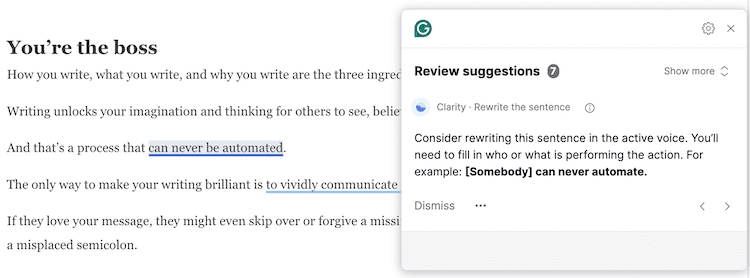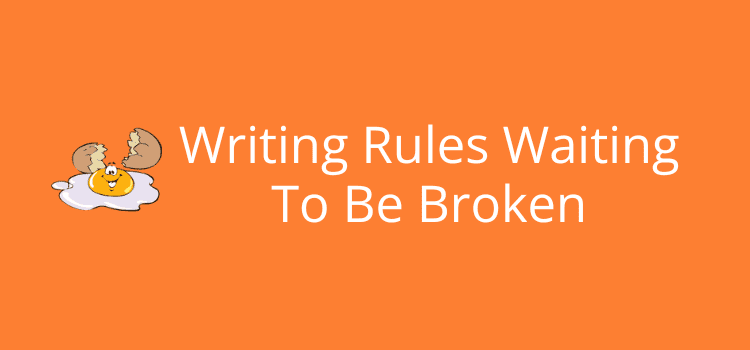
Writing with perfect grammar is so easy now. All you need is a grammar checker, or use one of the many new AI tools to help you.
In a way, this is a good thing because poor grammar is an easy way to lose a reader, and it’s so easy to avoid now.
However, grammar is not the messenger: you are!
And that’s where all the grammar checkers in the world won’t help you. They might follow the rules, but they can’t think; only you can do that.
Good grammar only saves embarrassment
Yes, a clanging grammar error will stand out a mile for your readers.
Even a misplaced comma or a forgetful capitalization error can give fussy readers the creeps.
But let’s be honest. Once the initial shock wears off, grammar mistakes are simply annoying.
For sure, they don’t make your ideas shine; they just make your writing look sloppy.
However, a perfectly placed semicolon or colon won’t make your plot twist more thrilling, nor will correct subject-verb agreement turn a boring essay into a must-read.
Good grammar only means you care, but it can never deliver your message.
Readers remember your thoughts, ideas, and surprises, no matter whether you used whom or who.
It’s all about what you have to say, and how you say it that counts the most.
More than grammar, it’s your writing voice that carries your writing and keeps a reader’s attention.
Yes, you need to check carefully, but never make grammar your number one priority in your writing.
Perfect grammar, but it’s nonsense
Imagine placing your order in an expensive three-star Michelin restaurant.
I want the duck.
Give me the duck.
Well, yes, 100% flawless grammar, but good luck with the waiter being friendly and attentive for the rest of your expensive evening.
And that’s the problem. Your grammar can be flawless, your tone, style, politeness, and delivery matter much more.
You can be absolutely technically correct, but sound like you’ve just barked at a dog.
Here’s another quick example. Imagine one of your characters replying to a text message from a friend.
I acknowledge receipt of your message.
Got it, thanks!
Both are grammatically perfect, but the first one sounds like a legal letter and the other like a human being.
Now, compare the restaurant order again.
I think I would like to have the duck, please.
It’s polite, natural, and still grammatically sound, but more importantly, it carries the right tone.
You can see why situation and voice are crucial.
Grammar gives you the bare bones of a correct sentence, but it’s voice, tone, and context that put the flesh on the bones.
Ignore (almost) all rewrite suggestions

Almost every grammar or writing checker uses AI now. While that might sound like progress, AI grammar is a trap for many new writers.
What’s the trap? It’s applying rewrite or rephrase suggestions from these tools.
Even if you have zero basic grammar, spelling, or punctuation errors, these tools will still give you suggestions to change your text.
One example is Grammarly, which always suggests I replace make sure with ensure, delete prepositional phrases at the beginning of sentences, such as, in fact, and make all passive sentences active.
If I accepted all of the suggestions, I would turn my writing into bland AI slop, with no sense of me left in the text.
It’s one of the reasons I cancelled my premium subscription after many years.
For new writers, it’s always best to work on developing a unique writing voice and style. It might take some time and effort, but being you in writing is what works with readers.
However, if you rely too heavily on automated writing tools, you’ll never get there.
Write first, check last
Whenever you write, turn off any checking tools, especially annoying “check while you type” settings.
You need imagination to write, not a sergeant major wrapping you over the knuckles for every little typo you make.
When you write a first draft of any text, short or long, you are telling yourself the story. It’s not for readers; it’s for you.
Even the most experienced writers or authors make mistakes at this point. But these errors or typos are for later because they are unimportant.
What is important is your story, your message, your advice, or your opinion. Get that right first, even if it takes you three drafts to get there.
Only when you are sure you have a text worth reading is it time to check for errors.
Then, you can use an online checker to quickly find your typos, misspelled words, or missing commas.
However, use your judgment and don’t make any unnecessary corrections.
For example, you might have a good reason for using a passive sentence, so don’t “one-click” it to active just because a tool tells you.
If you split an infinitive, used an adverb, or even a double negative, so what?
Sure, you want to make sure that your text is free of annoying little errors, but you don’t want it to be free of you.
You’re the boss
How you write, what you write, and why you write are the three ingredients that make your writing yours.
Writing unlocks your imagination and thinking for others to see, believe, and understand.
And that’s a process that can never be automated.
The only way to make your writing brilliant is to vividly communicate your imagination to your readers.
If they love your message, they might even skip over or forgive a missing comma, two spaces between a couple of words, or even a misplaced semicolon.
Summary
Of course, grammar matters.
Clean sentences will stop readers from being distracted, but it’s your ideas, your tone, and your voice that will keep them reading.
So, yes, use grammar checkers for what they do best: catching typos and little slip-ups that can annoy.
But brilliance in writing doesn’t come from you ticking little grammar boxes. It comes from you.
Write with confidence, say something worth saying, and let your unique writing voice shine through.
Because at the end of the day, perfect grammar will not make your writing brilliant. Only you can do that.
Related Reading: How To Get Readers To Discover Your Writing
Share This Article


